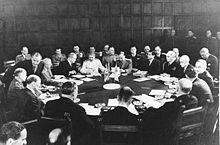On July 26, the United States, Britain and China produced the Potsdam Declaration which contained the terms that they demanded for the surrender of Japan. The Declaration required that Japan surrender immediately and without conditions. The surrender terms included:
- the elimination "for all time [of] the authority and influence of those who have deceived and misled the people of Japan into embarking on world conquest"
- the occupation of "points in Japanese territory to be designated by the Allies"
- "Japanese sovereignty shall be limited to the islands of Honshu, Hokkaido, Kyushu, Shikoku and such minor islands as we determine." As had been announced in the Cairo Declaration in 1943.
- "The Japanese military forces shall be completely disarmed"
- "stern justice shall be meted out to all war criminals, including those who have visited cruelties upon our prisoners"
The Declaration also included some clauses intended to reassure the Japanese people:
- "We do not intend that the Japanese shall be enslaved as a race or destroyed as a nation, ... The Japanese Government shall remove all obstacles to the revival and strengthening of democratic tendencies among the Japanese people. Freedom of speech, of religion, and of thought, as well as respect for the fundamental human rights shall be established."
- "Japan shall be permitted to maintain such industries as will sustain her economy and permit the exaction of just reparations in kind, but not those which would enable her to rearm for war. To this end, access to, as distinguished from control of, raw materials shall be permitted. Eventual Japanese participation in world trade relations shall be permitted."
- "The occupying forces of the Allies shall be withdrawn from Japan as soon as these objectives have been accomplished and there has been established, in accordance with the freely expressed will of the Japanese people, a peacefully inclined and responsible government."
At the end of the Declaration, came the demand for unconditional surrender and the penalty for refusal.
- "We call upon the government of Japan to proclaim now the unconditional surrender of all Japanese armed forces, and to provide proper and adequate assurances of their good faith in such action. The alternative for Japan is prompt and utter destruction."
One thing that was left out of the Declaration was the status and ultimate of the Emperor who the Japanese people considered to be divine. The question of whether he would be declared a war criminal and prosecuted or would be left free to become part of the future government was left open.
The United States made radio broadcasts to the Japanese home islands and dropped leaflets over population centers in Japan. Despite laws against listening to foreign radio broadcasts or reading dropped leaflets, most of the Japanese people became aware of the terms of the Potsdam Declaration.
The Japanese Supreme War Council rejected the Potsdam Declaration and a government spokesman met with the Japanese press to tell the Japanese people that the Declaration had been rejected and that Japan would fight on.
Potsdam Conference:
